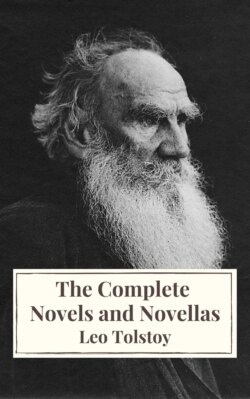Читать книгу Leo Tolstoy: The Complete Novels and Novellas - Leo Tolstoy - Страница 10
На сайте Литреса книга снята с продажи.
Chapter 8 — We Play Games
ОглавлениеThe hunt was over, a cloth had been spread in the shade of some young birch-trees, and the whole party was disposed around it. The butler, Gabriel, had stamped down the surrounding grass, wiped the plates in readiness, and unpacked from a basket a quantity of plums and peaches wrapped in leaves.
Through the green branches of the young birch-trees the sun glittered and threw little glancing balls of light upon the pattern of my napkin, my legs, and the bald moist head of Gabriel. A soft breeze played in the leaves of the trees above us, and, breathing softly upon my hair and heated face, refreshed me beyond measure. When we had finished the fruit and ices, nothing remained to be done around the empty cloth, so, despite the oblique, scorching rays of the sun, we rose and proceeded to play.
“Well, what shall it be?” said Lubotshka, blinking in the sunlight and skipping about the grass, “Suppose we play Robinson?”
“No, that’s a tiresome game,” objected Woloda, stretching himself lazily on the turf and gnawing some leaves, “Always Robinson! If you want to play at something, play at building a summerhouse.”
Woloda was giving himself tremendous airs. Probably he was proud of having ridden the hunter, and so pretended to be very tired. Perhaps, also, he had too much hard-headedness and too little imagination fully to enjoy the game of Robinson. It was a game which consisted of performing various scenes from The Swiss Family Robinson, a book which we had recently been reading.
“Well, but be a good boy. Why not try and please us this time?” the girls answered. “You may be Charles or Ernest or the father, whichever you like best,” added Katenka as she tried to raise him from the ground by pulling at his sleeve.
“No, I’m not going to; it’s a tiresome game,” said Woloda again, though smiling as if secretly pleased.
“It would be better to sit at home than not to play at ANYTHING,” murmured Lubotshka, with tears in her eyes. She was a great weeper.
“Well, go on, then. Only, DON’T cry; I can’t stand that sort of thing.”
Woloda’s condescension did not please us much. On the contrary, his lazy, tired expression took away all the fun of the game. When we sat on the ground and imagined that we were sitting in a boat and either fishing or rowing with all our might, Woloda persisted in sitting with folded hands or in anything but a fisherman’s posture. I made a remark about it, but he replied that, whether we moved our hands or not, we should neither gain nor lose ground — certainly not advance at all, and I was forced to agree with him. Again, when I pretended to go out hunting, and, with a stick over my shoulder, set off into the wood, Woloda only lay down on his back with his hands under his head, and said that he supposed it was all the same whether he went or not. Such behaviour and speeches cooled our ardour for the game and were very disagreeable — the more so since it was impossible not to confess to oneself that Woloda was right, I myself knew that it was not only impossible to kill birds with a stick, but to shoot at all with such a weapon. Still, it was the game, and if we were once to begin reasoning thus, it would become equally impossible for us to go for drives on chairs. I think that even Woloda himself cannot at that moment have forgotten how, in the long winter evenings, we had been used to cover an arm-chair with a shawl and make a carriage of it — one of us being the coachman, another one the footman, the two girls the passengers, and three other chairs the trio of horses abreast. With what ceremony we used to set out, and with what adventures we used to meet on the way! How gaily and quickly those long winter evenings used to pass! If we were always to judge from reality, games would be nonsense; but if games were nonsense, what else would there be left to do?
